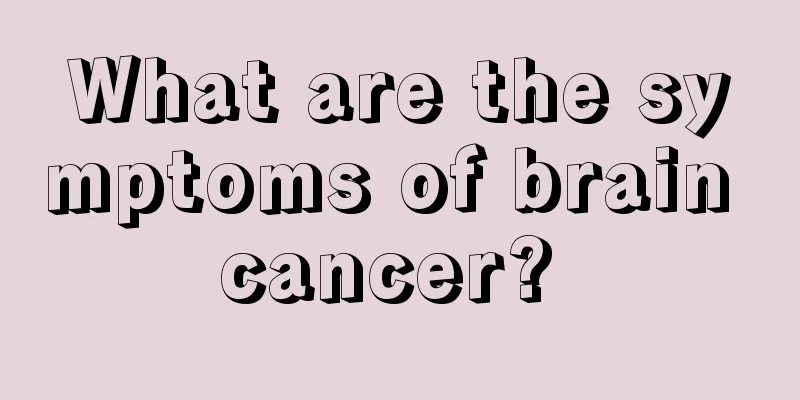What are the symptoms of brain cancer?

|
Regardless of the symptoms of benign brain tumors, they can basically be cured. Such as meningioma, pituitary adenoma, embryonic residual tumors and vascular tumors. If a malignant brain tumor grows in an unimportant brain tissue, it can almost be completely removed, and the patient can survive for a long time after surgery, or even be cured. Some benign brain tumors will turn into malignant ones. What are the symptoms of brain tumors? Early detection of brain tumors is crucial for treatment. Be vigilant when the following symptoms appear. 1. Morning headache: Headache often occurs at 4 or 5 o'clock in the morning, and is relieved or disappears after getting up and moving around. Tumors in the posterior cranial fossa can cause neck pain that radiates to the eye sockets, and the severity of the headache gradually increases as the disease progresses. Late-onset epilepsy is epilepsy that begins in adulthood. If there are no other triggers, a brain tumor should be considered first. Visual impairment: Increased intracranial pressure can cause edema due to poor venous blood return to the brain, resulting in decreased vision. In severe cases, the retina may have punctate, linear, or flaky lesions or even hemorrhage, causing blurred vision. Monocular exophthalmos: One eyeball protrudes forward. In severe cases, the eyelid does not close completely. The most common cause is a brain tumor. Decreased sensation: The parietal lobe, located in the middle of the cerebral hemisphere, is responsible for sensation. Tumors in this area can cause decreased or absent sensations such as unilateral limb pain and body shape discrimination. Unilateral deafness: If there is no history of otitis media or trauma, and only one ear has progressive hearing loss, accompanied by tinnitus on the same side, it is likely caused by an intracranial tumor compressing the auditory nerve. Hemiplegia: One is weakness or hemiplegia of one side of the body, manifested by less movement or immobility of the affected limb; the other is limb disorder on one side, manifested by clumsy or unstable movements. Projectile vomiting: Compared with vomiting caused by gastrointestinal diseases, vomiting in patients with brain tumors is not accompanied by abdominal distension, nausea, or diarrhea. However, when intracranial pressure increases, "projectile vomiting" will occur after a headache. Brain tumors should also be checked for in patients with mental abnormalities, olfactory hallucinations (often smelling odors that do not actually exist, such as burning rubber, burnt rice, etc.), gigantism, and acromegaly. Director Mai emphasized that for brain tumors, one should choose a regular professional hospital and seek treatment from a professional brain tumor specialist to avoid delaying treatment. Brain tumors should also be checked for in patients with mental abnormalities, olfactory hallucinations (often smelling odors that do not actually exist, such as burning rubber, burnt rice, etc.), gigantism, and acromegaly. Projectile vomiting: Compared with vomiting caused by gastrointestinal diseases, vomiting in patients with brain tumors is not accompanied by abdominal distension, nausea, or diarrhea. However, when intracranial pressure increases, "projectile vomiting" will occur after a headache. Hemiplegia: One is weakness or hemiplegia of one side of the body, manifested by less movement or immobility of the affected limb; the other is limb disorder on one side, manifested by clumsy or unstable movements. Unilateral deafness: If there is no history of otitis media or trauma, and only one ear has progressive hearing loss, accompanied by tinnitus on the same side, it is likely caused by an intracranial tumor compressing the auditory nerve. Decreased sensation: The parietal lobe, located in the middle of the cerebral hemisphere, is responsible for sensation. Tumors in this area can cause decreased or absent sensations such as unilateral limb pain and body shape discrimination. Monocular exophthalmos: One eyeball protrudes forward. In severe cases, the eyelid does not close completely. The most common cause is a brain tumor. Visual impairment: Increased intracranial pressure can cause edema due to poor venous blood return to the brain, resulting in decreased vision. In severe cases, the retina may have punctate, linear, or flaky lesions or even hemorrhage, causing blurred vision. Late-onset epilepsy. If epilepsy begins in adulthood without other triggers, a brain tumor should be considered first. 1. Morning headache: Headache often occurs at 4 or 5 o'clock in the morning, and is relieved or disappears after getting up and moving around. Tumors in the posterior cranial fossa can cause neck pain that radiates to the eye sockets, and the severity of the headache gradually increases as the disease progresses. What are the symptoms of brain tumors? Early detection of brain tumors is crucial for treatment. You must be alert when the following symptoms appear. Regardless of the symptoms of benign brain tumors, they can basically be cured. Such as meningioma, pituitary adenoma, embryonic residual tumors and vascular tumors. If a malignant brain tumor grows in an unimportant brain tissue, it can almost be completely removed, and the patient can survive for a long time after the operation, or even be cured. Some benign brain tumors may turn into malignant ones. The above is some knowledge about brain cancer that we have prepared for you today. We hope it will be helpful to you. If you have any other needs, you can also consult our online consulting experts at Feihua Health Network. We are always here to answer your questions. Feihua Health Network is always by your side and cares about your health issues! Feihua Health Network wishes you good health! Brain cancer: http://www..com.cn/zhongliu/na/ |
<<: Beware! Irregular lifestyle can lead to laryngeal cancer
>>: What are the causes of laryngeal cancer
Recommend
What foods help digestion?
Healthy digestion of the stomach is very importan...
Sitting in the office for a long time can lead to a high incidence of cervical cancer. What are the other causes of cervical cancer?
According to statistics from the World Health Org...
What are the treatments for presbyopia?
Presbyopia mainly refers to a phenomenon that occ...
Traditional Chinese Medicine Syndrome Differentiation and Classification of Esophageal Cancer
Esophageal cancer is classified as "dysphagi...
What are the precancerous diseases of gastric cancer?
What are the precancerous diseases of gastric can...
What kind of underwear should a young girl wear
For young girls, many of them are in contact with...
A cold that lasts for half a month is AIDS
Speaking of AIDS, many people should feel afraid,...
Where is the best hospital for treating nasopharyngeal cancer
In recent years, the number of patients suffering...
There are many insect bites on my body
Everyone's skin condition is different. Some ...
How long is the survival period of nasopharyngeal carcinoma and what is the treatment for the first stage?
For many people today, early treatment of nasopha...
How long does it take to completely cure fibroids?
How long does it take for fibroids to be complete...
What causes coughing and heart pain
Coughing is a common occurrence and can be caused...
How long can a patient with advanced liver cancer live? These three factors affect it
When there are too many toxins in the body, or wh...
What color clothes are suitable for dark yellow skin?
There are some people around us who are particula...
What are the causes of liver cancer? Experts explain the reasons for the high incidence of liver cancer
Cancer cases are increasing every year. People wi...









